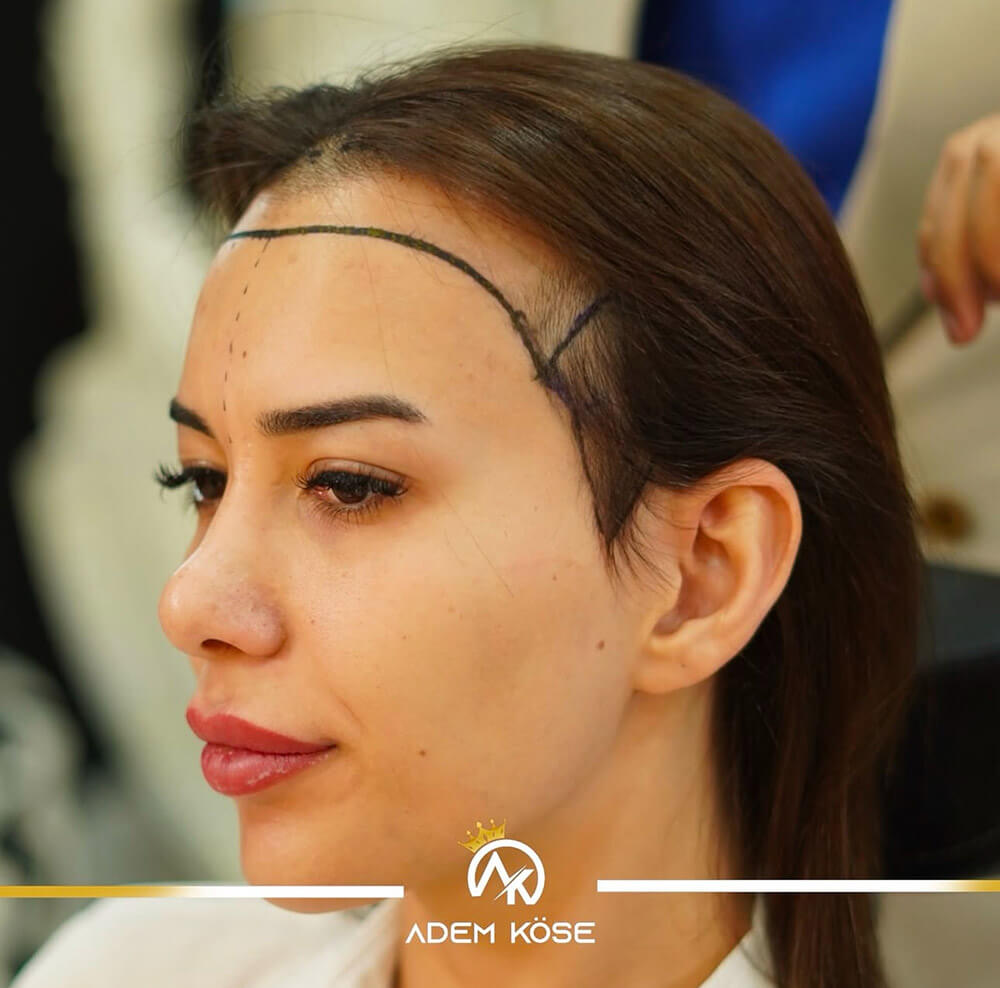Hair Transplant for Women – Restoring Confidence with Natural Results
Hair loss can be a deeply personal and emotional experience for women. Whether it’s thinning hair, a receding hairline, or bald patches, the impact on self-esteem and confidence can be significant.
Fortunately, hair transplant for women has emerged as a highly effective solution to restore natural-looking hair and reclaim confidence. This comprehensive guide explores everything you need to know about female hair transplants, including techniques, benefits, costs, and more.
Your Hair Journey at a Glance
Discover the key steps of your personalized hair restoration journey. From consultation to aftercare, we make every step simple and clear for you. Let’s take a closer look at how it all comes together.
Step 1: Free Consultation
Step 2: Hair Analysis
Step 3: Treatment Planning
Step 4: Travel & Procedure
Discover the Truth: 500+ Genuine Patient Reviews Speak for Themselves
See what our patients have to say about their transformative journey and outstanding results with our expert care.
OUR CLINIC & HOTEL
Scientific Hair Transplant Clinic
Understanding Female Hair Loss
Causes of Hair Loss in Women
Hair loss in women is more common than many realize, affecting nearly 40% of women by age 50. Understanding its causes is key to finding the right treatment. One major cause is genetic—female pattern hair loss (androgenetic alopecia) typically leads to gradual thinning rather than bald patches. Hormonal changes, including pregnancy, menopause, and PCOS, often trigger temporary or long-term shedding.
Medical conditions such as thyroid disorders, alopecia areata, or the effects of chemotherapy may also lead to significant hair loss. Additionally, stress, poor nutrition, and harsh styling habits—like overuse of heat tools or tight hairstyles—can weaken the hair over time.


Hair Transplant Techniques for Women
Modern advancements in hair restoration have made transplants for women more precise, natural-looking, and minimally invasive.
Female Hairline Transplant
This method focuses on restoring or reshaping the hairline, especially for women experiencing frontal thinning or naturally high foreheads. Surgeons design soft, curved hairlines that frame the face and enhance femininity by using fine, single-hair grafts for a feathered, undetectable finish.
Follicular Unit Extraction (FUE) for Women
FUE involves harvesting individual hair follicles from the donor area and implanting them into thinning zones. It’s a minimally invasive approach, leaving only tiny dot-like scars that are hardly noticeable—ideal for those who prefer versatile hairstyles. Recovery is fast, and the results look natural due to precise follicle placement.
Follicular Unit Transplantation (FUT) for Women
FUT, or the strip method, involves removing a section of the scalp from the donor area and dividing it into individual grafts. This method is useful for cases needing a large number of grafts. While it does leave a linear scar, it’s often hidden under longer hair and offers a higher graft yield in one session.
Hair Grafting for Women
Hair grafting is a flexible option that allows healthy follicles to be transferred to areas with thinning hair. It’s customizable and can be used to treat anything from minor thinning to more widespread loss, depending on each patient’s needs and goals.
Ideal Candidates for Female Hair Transplant
Not all women with hair loss are suitable for transplantation. A professional assessment is crucial to determine eligibility.
Assessing Your Candidacy
Candidates are generally women over 25 with stabilized hair loss. Those with androgenetic alopecia, traction alopecia (from tight hairstyles), or scarring alopecia often benefit most. Patients with diffuse thinning may require additional tests to evaluate donor area strength.
Importance of Donor Hair Quality
The quality and quantity of donor hair—typically taken from the back or sides of the scalp—directly affect the success of the transplant. If the donor area is too thin, alternative treatments might be recommended instead of surgery.
Personalized Treatment Planning
Each procedure is tailored to the individual. A thorough consultation helps define the patient’s hair loss pattern, aesthetic goals, and the most suitable technique. This customized approach ensures natural, long-lasting results.


Procedure Overview
Step-by-Step Hair Transplant Surgery
Preparation begins with a medical consultation and scalp analysis. Patients may be advised to stop certain medications or habits, like smoking, to support healing.
During surgery, hair follicles are extracted either individually (FUE) or as a strip (FUT). They are then implanted one by one into the target area, with careful attention paid to hair angle and density. After surgery, patients receive a care guide covering scalp hygiene, physical activity restrictions, and sun protection.
Benefits of Hair Transplantation for Women
Enhanced Appearance and Self-Confidence
A successful transplant can significantly restore volume and improve the appearance of thinning hair. Many women report feeling more attractive and comfortable in both personal and professional settings.
Psychological and Emotional Benefits
Beyond physical transformation, hair restoration can lead to improved self-esteem and emotional well-being. Patients often feel more empowered and optimistic, especially after years of hiding or managing hair loss.
Cost of Female Hair Transplant
Factors Influencing Hair Transplant Cost
Costs depend on the number of grafts required, which usually ranges between 1,500 to 3,000 for women. Other factors include the surgeon’s experience, clinic location, and the technique used. Clinics with a strong reputation may charge more, but typically offer better outcomes.
Payment and Financing Options
Many clinics provide payment plans or financing to make procedures more accessible. Some also offer packages that include consultation, surgery, medications, and aftercare support.
Alternative Hair Restoration Options
Non-Surgical Hair Replacement
For women not ready for surgery, options like wigs, toppers, or extensions offer immediate but temporary coverage. These solutions are ideal for those with extensive or unstable hair loss or those waiting to become transplant candidates.
PRP (Platelet-Rich Plasma) therapy is another non-surgical approach that uses your own plasma to stimulate follicle activity and encourage hair regrowth. It can be used on its own or as part of a combined treatment plan.
Modern Alternatives to Traditional Hair Plugs
Outdated methods like hair plugs have largely been replaced by techniques such as FUE and FUT, which provide far more natural outcomes. These advanced techniques minimize scarring, ensure natural direction of growth, and deliver long-term results.

Hair Transplant for Women – Frequently Asked Questions
We have compiled the most frequently asked questions about the topics you are curious about. You can contact us for more information.
Yes, absolutely. While hair transplants are more commonly associated with men, many women suffer from thinning hair, receding hairlines, or diffuse hair loss and can benefit from hair transplantation. The main difference lies in the pattern of hair loss—women often experience diffuse thinning rather than bald patches, which requires a tailored approach. A detailed consultation is essential to determine candidacy based on hair density, scalp health, and overall medical history.
Hair loss in women can result from genetics, hormonal changes (e.g., pregnancy or menopause), stress, nutritional deficiencies, or medical conditions such as PCOS or thyroid imbalances. A transplant is typically recommended when non-surgical treatments (like PRP or medication) are not effective, and the donor area at the back of the scalp has sufficient healthy follicles. It’s most successful in treating female pattern baldness and localized thinning.
Yes. Modern techniques such as Follicular Unit Extraction (FUE) and Direct Hair Implantation (DHI) allow for precise placement of each hair follicle, mimicking natural growth patterns. Surgeons consider hair texture, direction, and density to ensure the results blend seamlessly with existing hair. Once healed, the transplanted hair can be washed, styled, and colored just like the rest of your hair.
Recovery is generally smooth and takes about 7–10 days for the scalp to heal. Mild redness, swelling, or scabbing may occur in the donor and recipient areas, but these symptoms typically subside within a few days. Women are advised to avoid heat styling, chemical treatments, and intense physical activity during the early healing phase. New hair growth typically begins around 3–4 months, with full results visible at 9 to 12 months.
Like all surgical procedures, hair transplants carry some risks—though they are minimal when performed by experienced professionals. Potential side effects include temporary shock loss, mild discomfort, or uneven growth during early phases. A common limitation is diffuse unpatterned alopecia (DUPA), where donor hair is also weak or thinning, making transplantation less effective. A thorough diagnosis helps identify the right candidates and maximize success rates.











